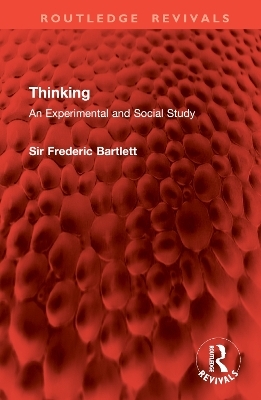
Thinking
An Experimental and Social Study
Seiten
2024
Routledge (Verlag)
978-1-032-86901-8 (ISBN)
Routledge (Verlag)
978-1-032-86901-8 (ISBN)
First Published in 1958, Thinking Introduces a number of simple experiments which can all be repeated by anybody who is interested. There is no doubt that Sir Frederick’s experimental study is a work of first importance.
First Published in 1958, Thinking Introduces a number of simple experiments which can all be repeated by anybody who is interested. They show that the thinker is all the time trying to fill up gaps in information that is available to him in such a manner that there is a good prospect that all other thinkers, given the same incomplete information, will agree with him. How, and what are the conditions, under which he does this, are considered and illustrated a) for formal thinking; b) for the thinking of the experimental scientist; c) for everyday thinking, and d) for the thinking of the artist.
A great many of the processes used in thinking have been developed at a level of bodily skill, and long before thinking proper becomes possible at all. At the same time, it becomes clear, as the investigation proceeds, that thinking processes have important characteristics and rules peculiar to themselves. These also vary according to the fields of information in which the thinker operates. There is no doubt that Sir Frederick’s experimental study is a work of first importance and will be useful for scholars and researchers of psychology.
First Published in 1958, Thinking Introduces a number of simple experiments which can all be repeated by anybody who is interested. They show that the thinker is all the time trying to fill up gaps in information that is available to him in such a manner that there is a good prospect that all other thinkers, given the same incomplete information, will agree with him. How, and what are the conditions, under which he does this, are considered and illustrated a) for formal thinking; b) for the thinking of the experimental scientist; c) for everyday thinking, and d) for the thinking of the artist.
A great many of the processes used in thinking have been developed at a level of bodily skill, and long before thinking proper becomes possible at all. At the same time, it becomes clear, as the investigation proceeds, that thinking processes have important characteristics and rules peculiar to themselves. These also vary according to the fields of information in which the thinker operates. There is no doubt that Sir Frederick’s experimental study is a work of first importance and will be useful for scholars and researchers of psychology.
Sir Frederic Bartlett was a British psychologist best known for his studies of memory.
Preface 1. Thinking as a Form of Skill 2. Thinking within Closed Systems- 1 Interpolation 3. Thinking within Closed Systems-2 Extrapolation 4. Thinking within Closed Systems- 3 Evidence in Disguise 5. Theoretical 6. Adventurous Thinking- 1 Two Transitional Experiments 7. Adventurous Thinking- 2 The Thinking of the Experimental Scientist 8. Adventurous Thinking- 3 First-Hand about Experimental Thinking 9. Adventurous Thinking- 4 Everyday Thinking 10. Adventurous Thinking- 5 The Artists Thinking Index
| Erscheinungsdatum | 22.08.2024 |
|---|---|
| Reihe/Serie | Routledge Revivals |
| Verlagsort | London |
| Sprache | englisch |
| Maße | 156 x 234 mm |
| Gewicht | 535 g |
| Themenwelt | Geisteswissenschaften ► Psychologie ► Allgemeine Psychologie |
| ISBN-10 | 1-032-86901-1 / 1032869011 |
| ISBN-13 | 978-1-032-86901-8 / 9781032869018 |
| Zustand | Neuware |
| Haben Sie eine Frage zum Produkt? |
Mehr entdecken
aus dem Bereich
aus dem Bereich
Buch | Softcover (2024)
Hogrefe Verlag
CHF 46,50
wie Affekte innere Entwicklung ermöglichen
Buch | Softcover (2023)
Klett-Cotta (Verlag)
CHF 41,95


